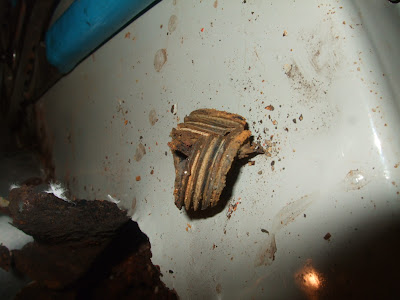HandyBat!
I spent a good chunk of this weekend being a handyman for friends--probably good practice for my ideal retirement plan of loading up a truck with my tools and driving around the country fixing up the houses of my friends.
On Friday, I got a call from P & D out in Burlington--I lived with them for a summer, when I first moved back to Boston. D. was taking the day off, then heard these noises from downstairs. She went down, and found that there was a geyser of hot water erupting from the top of the tank, spraying the basement with 120 F water. After finding the shutoff valve, they gave me a call, to see if I could come help them out--they had solicited my advice on tankless water heaters before, so it seemed to make sense to talk now.
So I got home from work home that evening, grabbed my plumbing bucket, changed into Carhartts, and drove out to their place.

Oh wow. Ouch. The output nipple sheared off inside the copper fitting. No, it's not a dirty word there--check out the link (SFW)--that's what you call a short length of pipe, okay?
I started to debride the wound of the water heater--I already knew it was going to be bad, given that the unit is 12 years old, and you could see rust pockmarks coming through from inside. But exposing the full damage was pretty bad:

Youch. Looks like there's been a leak there for a while. Don't let your water heaters get into this condition, people! But digging through the rust felt like <documentaryvoice>...after the artifacts were recovered from the sea floor, it was urgent to keep them underwater. The cold, low-oxygen conditions had previously preserved these items, which began to rust immediately after bringing them to the surface...</documentaryvoice>
There was still a broken-off stub of pipe stuck in the water heater. Hrm.

The judicious use of a pipe wrench and some abuse resulted in... grr, a busted off pipe still stuck in the water heater. Crap. Various valiant efforts were made--pipe extractor--unfortunately, my kit only has the wrong size, or the wrong type; I really need a 3/4" screw-type nipple extractor. Enough sniggering, you. Continued work included hammering with a screwdriver and ample foul language. No use. Then, I did the last-ditch effort of using a hacksaw blade to cut two weakening cuts in the "ring" of broken pipe, and did some more hammering and prying. Booyah!

I came back the next morning to finish off the install--it will limp along for a week or so--hope they can get a new unit installed by then.

After having lunch with them, I headed out to Sudbury, to help another set of friends--they are building a new house on their property (and will demolish the dumpy old place down the hill when it is done). They were working on hardwood flooring today; I helped them finish off a room. I've never put down ~3 or 4" oak flooring before--goes down a bit faster than the typical 2-1/4" stuff. They had a non-pneumatic nailer--it actually works pretty well; maybe two or three strikes to drive the nail.

We then hung out for the evening--they made dinner. A very nice evening. Unfortunately, Sudbury is right in the middle of the box bounded by 128/495 and Mass Pike/Route 2, so it's a bit annoying to get there.
This friend happens to be the former coworker who is doing an insanely all-solar house--all the great features I love to see, and then some. Both PVs (electricity) and solar thermal (both for hot water, and for storing energy for space heating), not to mention a lot of south-facing glazing (passive solar gains). He even went and climbed the adjacent trees to top them off, so they don't shade the array. He's pretty friggin' hard core (he's the one that used to bike in to Somerville from Sudbury, every day, rain or shine).

I've had the tour before--he's currently getting negative energy bills. Annoyingly, though, when utilities do net metering (i.e., paying you for what you generate) you only get 6 cents per kWh, instead of the 19 cents per kWh that you pay to buy juice. Their game, their rules, they win.


2 Comments:
Wow are you a glutton for punishment! Everyone knows that water heaters were designed by Satan to enrage homeowners and amateur plumbers, driving them to the brink of madness. I have one standing in my driveway, three years out of service, still mocking me. It first stood in the basement for three years too heavy for mortals to move. Then I told a couple of college kids that there was a bunch of chocolate bars at the bottom of it for the taking if they would just move it out. Suckers. Of course it was replaced by another POS heater--unless you spend about the US GDP for a unit, this is what you'll end up with too, and I don't care what the name says on the side--and it is already planning how it will ruin my weekend/week some 3 to 6 years from now. The one before this one spat half its contents on our basement floor at 11 PM on a Saturday night before being bailed out one scalding hot bucket of water at a time handed out the 14" awning window of our basement. That was just before my wife and I did it all over again after I failed to make a proper solder connection on the new one. By then it was 3:00 AM the next day and I did it all over again. The only good news on that story was that it was the first time in history that I went to Home Depot and bought all the correct parts that I would need for a job. It was before the days of digital photography and I drew the entire apparatus on a piece of cardboard and took it to HD and showed it to the ex-plumber in aisle 11. "Yup, you'll probably need that one..." Sure I put a couple of pieces on irrevocably backwards, but still, I was delighted not to make a return trip. Plumbing code schmumming code.
Give me a call, I want to talk skylights with you. DdS
Annoyingly, though, when utilities do net metering (i.e., paying you for what you generate) you only get 6 cents per kWh, instead of the 19 cents per kWh that you pay to buy juice. Their game, their rules, they win.
One piece of good news that I read in the September 2008 Energy Design Update:
Massachusetts Passes Energy Bill
BOSTON, MA -- Both houses of the Massachusetts legislature have unanimously passed an energy bill, the Green Communities Act, that is expected to be signed by the governor. Among other provisions, the bill includes net-metering regulations requiring utilities to buy renewable energy from small producers at retail rates. The Cape Cod Times reported that Allen Kolchinsky, the chairman of the Renewable Energy Committee in Orleans, Massachusetts, greeted news of the bill’s passage with jubilation. “We are very excited about the possibility of having this come through,” said Kolchinsky. The net-metering aspects of the bill are extremely important for us to make plans feasible for various wind and photovoltaic projects.”
Post a Comment
<< Home